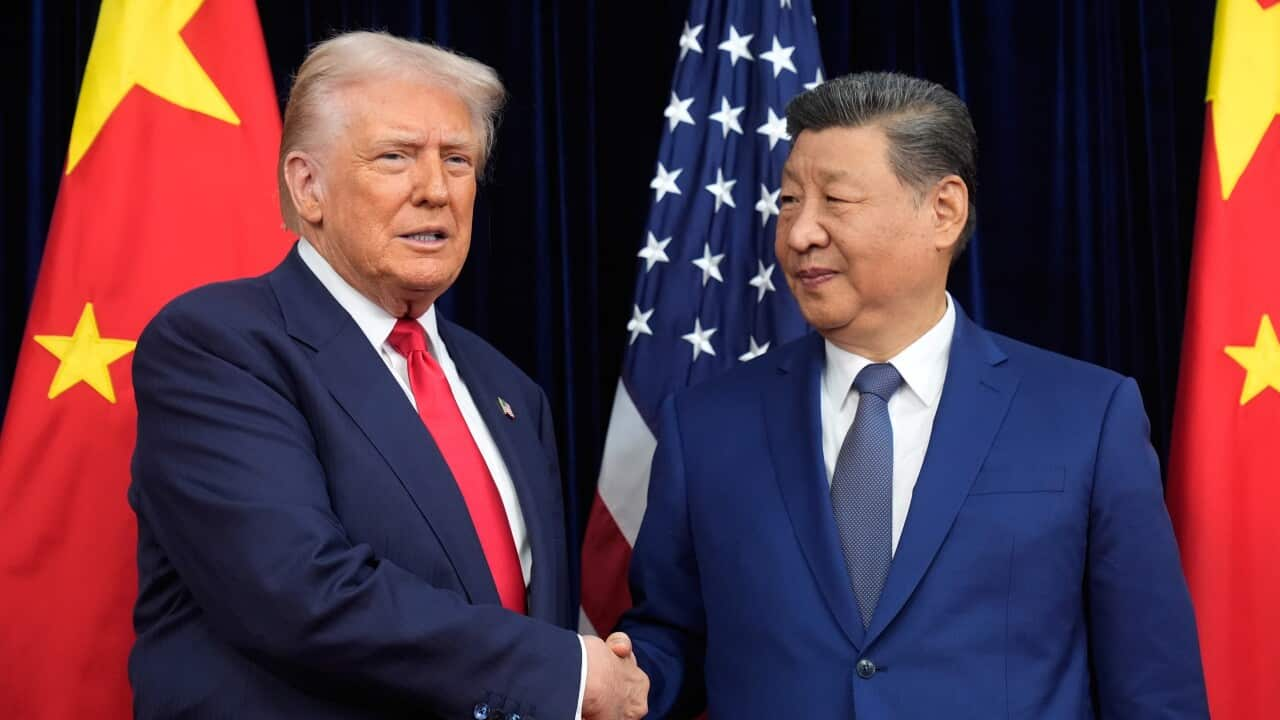US President Donald Trump has hailed "an outstanding group of decisions" made during a meeting with Chinese President Xi Jinping on the sidelines of the Asia-Pacific Economic Cooperation (APEC) summit, indicating that a trade deal could come "pretty soon".
Trump described the meeting as "amazing" and said tariffs on China "will be 47 per cent, down from 57 per cent."
He said tensions over rare earths had been "settled", without clarifying further, after China recently tightened export controls on the highly sought-after elements.
"We've come to conclusions on many very important points, and we'll be handing that to you in a little while," Trump said on Thursday while on board the presidential plane, Air Force One.
"We have not too many major stumbling blocks."
Among those conclusions is a reduction in tariffs on China related to fentanyl from 20 per cent to 10 per cent.
"He's going to be very strong in enforcing the fentanyl — everything having to do with fentanyl and regulations internally, including taking very strong measures against those that don't obey," Trump said, speaking of a response agreed to by President Xi.
Additionally, China will start buying US soybeans immediately after approving the resumption of purchases on Wednesday, according to Trump.
But he clarified that: "a variety of other tariffs still remain."
The war in Ukraine also rated highly in their meeting agenda — a conversation which Trump said omitted Russian oil.
"We agree the sides are, you know, locked in and fighting — and sometimes you have to let them fight," he said.
"But he's going to help us, and we're going to work together on Ukraine."
The meeting between Trump and Xi capped off the US president's whirlwind trip across Asia.
As they sat down with their delegations to start talks, Xi told Trump, via a translator, that it was normal for the two leading economies of the world to have frictions now and then.
Trump has repeatedly expressed optimism about reaching an agreement with Xi during the talks, buoyed by a breakthrough in trade talks with South Korea on Wednesday.
Earlier, Prime Minister Anthony Albanese expressed hope for a truce in the trade tensions between the world's two largest economies.
Albanese, also at the APEC summit, said he was hopeful the US-China talks will amount to a "positive outcome".
"The United States and China have an important role as the two major economic powers that exist in our region," he said on Thursday.
"These are important relationships for Australia."
"We want to see less tension in trade, and we want to see a positive outcome going forward".
A new Cold War
But with both countries increasingly willing to play hardball over areas of economic and geopolitical competition — which analysts see as a new Cold War — many questions remain about how long any trade detente may last.
The trade war reignited this month after China proposed dramatically expanding curbs on exports of rare earth minerals, a sector it dominates.
Trump vowed to retaliate with additional 100 per cent tariffs on Chinese exports, and with other steps, including potential curbs on exports to China made with US software — moves that could have upended the global economy.
"THE G2 WILL BE CONVENING SHORTLY," Trump posted on Truth Social shortly before landing in Busan.
In a separate post, he said the US would step up testing of nuclear weapons immediately, noting China's growing arsenal. Trump declined to respond to a reporter's question on the post at Thursday's meeting.
After a weekend scramble among top trade negotiators, US treasury secretary Scott Bessent said he expected China to delay the rare earth controls for a year and to revive purchases of US soybeans, critical to American farmers, as part of a "substantial framework" to be agreed by the leaders.
Ahead of the summit, China bought its first cargoes of US soybeans in several months, Reuters reported on Wednesday.
Regional strategic tensions, particularly over Taiwan, a US partner and high-tech powerhouse, are another ominous backdrop to the summit. Although Trump indicated he did not plan to raise the issue of Taiwan's security with Xi.
"It never came up. Taiwan never came up — was not discussed actually," Trump said on Thursday.
China claims Taiwan as its own territory, which should be taken by force if necessary. Taiwan says it is an independent country and will defend its freedoms and democracy, blaming China for tensions.
Chinese state media reported Chinese H-6K bombers recently flew near Taiwan to practise "confrontation drills".
US secretary of state Marco Rubio said Taiwan should not be concerned about the US-China talks, despite some experts expressing fears that Trump might offer concessions over the island.
The US is required by its own law to provide Taiwan with the means to defend itself.
For the latest from SBS News, download our app and subscribe to our newsletter.

